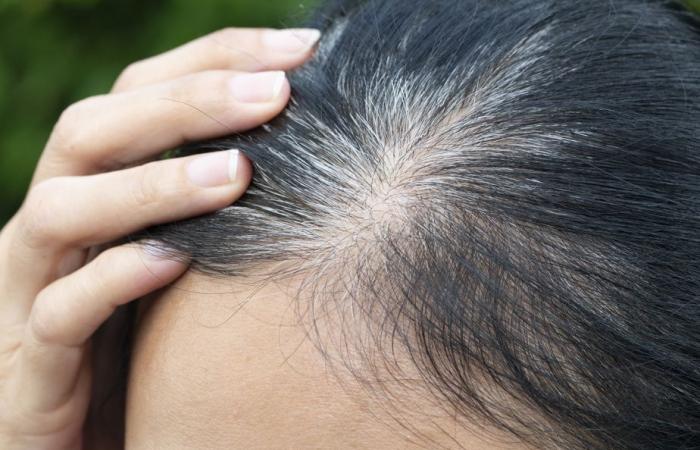It’s hard, accepting your white hair. Especially when they arrive early. Is there a way to slow down the process, or even reverse it? A lifestyle habit to change, a supplement, a treatment? A dermatologist and a psychobiology researcher take stock of what we know, and what we can do.
Posted yesterday at 7:00 p.m.
From white… to brown
Returning from his vacation a few years ago, Martin Picard spotted a particular hair on his head: white at the end, pigmented at the root. “When I looked in the mirror, I found four others, repigmented at the same time, while I was on vacation,” says the associate professor at Columbia University, in New York.
This discovery was not accidental: Martin Picard and his colleagues were then carrying out a study on the question. After two and a half years of recruitment, they were able to recruit 14 participants, aged on average 35 years, all of whom found one or more repigmented hairs on their scalp. It is documented several times in scientific literature: white hair has the potential to regain its youthful color. It’s rare, but it happens.
Genetics and environment
Hair color is maintained by a pigment called melanin, also responsible for skin pigmentation. When a hair turns white, it is because cells located in its follicle – the melanocytes – no longer produce melanin efficiently enough, explains dermatologist Elena Netchiporouk.
“As in any aspect of medicine, we can talk about genetic and environmental factors,” explains the assistant professor at McGill University. In recent years, several genes have been identified as risk factors for premature gray hair. By premature, we are talking about less than 20 years for whites, 25 years for Asians and 30 years for blacks.
Rayons UV
Among the factors that can be controlled to delay the process, Elena Netchiporouk thinks first of ultraviolet rays.
“UVA causes oxidative stress [une forme d’agression de la cellule]and this is something that melanocytes do not tolerate,” summarizes the dermatologist, who advises covering your head in the sun.
That’s probably why dark-skinned people keep their colored hair longer, she says: “They’re better equipped to defend against UV rays.” » Smoking and obesity are also associated with the early appearance of gray hair.
Nutrition and thyroid
Anemia and autoimmune conditions (vitiligo, hypothyroidism) can also be the cause. “Vitamin D, vitamin B12, folic acid, iron, all that is important,” summarizes Elena Netchiporouk. If you have a nutritional deficiency, it will predispose you to premature gray hair. » On social networks, influencers recommend all kinds of supplements – iron, vitamin B12copper – to delay, even reverse the graying of hair. “If there is a deficiency, supplements can be offered, but there are not enough studies to say that we should take them without a deficiency,” indicates the Dre Netchiporouk. Researcher Martin Picard is of the same opinion: “If there is a deficiency, yes, but without that, I don’t think it’s worth it,” he says.
Emotional stress
We all know people whose hair has turned white after a stressful period… Coincidence or precipitating factor? “When we are stressed, our nervous system will secrete norepinephrine, which also has a harmful effect on the oxidative stress of melanocytes,” indicates the Dre Netchiporouk, who also advises controlling your stress factors and better managing your stress.
The link between emotional stress and white hair remains relatively poorly documented. According to researcher Martin Picard, his study, published in 2021, is the first to measure it quantitatively. “We saw some really striking correlations,” assures the researcher, who is interested in the links between the body and the mind. In some participants, he says, the times when hair turned gray or pigmented again corresponded to periods of significant stress or relaxation: a separation, a vacation.
Consult the study (in English)
Energy
If we take a long vacation, if we leave a stressful job, how much can we expect to get back some of our hair from yesteryear? “I think that for hair that has recently lost its pigmentation, there is potential, but for hair that has been white for 20 years… I don’t know if there is hope,” replies Martin Picard. It’s as if there is a window of possibility for every strand of hair, he says. “This is what our model predicts: this hair is going to be white, it doesn’t matter, and the reduction in stress, physical activity or rest were able to bring back the color,” he illustrates. .
His team also compared the “molecular signature” of white hair and pigmented hair. In his laboratory, Martin Picard studies mitochondria, the energy portrait of the cell. Is white hair sleepy hair, a little loose? No, instead, researchers found that aging hair uses more energy. It seems contradictory, but Martin Picard has an explanation.
The hair gradually accumulates damage, and it reaches a threshold. He makes the decision: OK, I don’t have enough energy anymore – I’m going to concentrate on surviving. So, I cut off melanin production.
Martin Picard, associate professor at Columbia University, New York
The brain would in some way be the broker of the body’s energy expenditure, according to the model of Martin Picard and his colleagues Evan D. Shaulson and Alan A. Cohen, published last fall in the scientific journal Nature Aging. As aging cells cost more, the brain would gradually eliminate what is not a priority. This is how as we age, muscle mass decreases, testosterone too, the senses dull, and the hair… turns white. “I think that bleaching my hair is a wise decision: the body is trying to save energy to allow me to live a good life,” summarizes Martin Picard.
Treatments
Currently, there is no medical treatment to repigment hair. Some products sold online or in pharmacies have this claim, but nothing is scientifically proven. Therapies whose effectiveness has been demonstrated mainly increase hair density (like minoxidil), which can serve as camouflage, explains Dr.re Elena Netchiporouk. “But I think that, in five years, this conversation would be completely different,” says the dermatologist.
Research is progressing, she says, and the causes of hair whitening are becoming clearer. In the literature, we also find stories of patients, whose hair had turned white too early due to an illness, who regained their color after treatment (immunotherapy, for example). “Once we learn that there are certain systemic things that can work, researchers can introduce these ingredients into topical formulations, so in lotions, creams, sprays,” she illustrates.
Martin Picard, for his part, is not particularly enthusiastic about the prospect of a drug that would force cells to produce melanin. He takes us back to his team’s hypothesis: when the body ages, the brain must manage a tighter energy budget. “Perhaps your hair will regain its beautiful color, but… perhaps it will also steal energy from your brain,” he concludes.
90 %
Up to 90% of the variability in hair aging could be attributed to genetic factors, according to some studies.
Source : « Premature hair graying : a multifaceted phenomenon », International Journal of Dermatology2024





